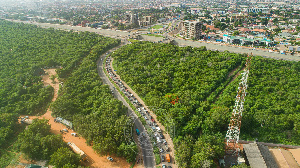Published
3 years agoon
By
Joe Pee
Government’s decision to degazette portions of the Achimota Forest Reserve through the Executive Instrument 144, which took effect on 1st May, 2022, has generated a lot of controversy in the Ghanaian media with varied comments being expressed about the propriety of the action amidst government’s stated commitments to environmental protection.
Although the government says the degazetted portion, about 361 acres, is being ceded to the allodial owners of the forest land, the Owoo family, environmentalists insist that the government ought to protect and preserve it due to its importance.
In the cause of the conversion, a purported Will of former Forestry Commission head, Kwadwo Owusu Afriyie, also known as Sir John, has become public.
In the purported Will, Sir John bequeathed acres of lands he owned in his name and others he owned in the name of his companies in the Achimota forest to some relatives.
He also willed acres of specified and unspecified land at the Sakumono Ramsar site to relatives.
Many have spoken against the development and accused the late Sir John of taking advantage of his office to amass for himself lands that ought to be protected for the state.
The Lands Commission has already said that it has no records to show that Sir John owns lands in the Achimota Forest, but the Ministry for Lands and Natural Resources has said while the purported Will is a subject of litigation, it is revoking any authority of the said Achimota forest and Sakumono Ramsar site lands to any private individual.
But what do the laws of Ghana say about returning state acquired lands to their allodial owners?
In the case of Nii Kpobi Tettey Tsuru v Attorney-General [2010] SCGLR 904
Dotse JSC in his ruling stated that;
“We are certain in our views that Article 20 of the Constitution, 1992 only deals with land acquisitions that are effected after the 1992 Constitution came into effect, and this by operation of law is January 7th, 1993.
Our conviction and resolve is further buttressed by the provisions in Article 20(2) of the Constitution which provide that compulsory acquisition of property by the State can only take place under a legal regime which provides for prompt payment of fair and adequate compensation and a right of access to the High Court by any affected person of such an acquisition.
It must be noted that there have been several instances of a lot of acquisition of lands by the State in the past, for which compensation has not yet been paid.
If the Constitutional provisions should have retrospective effect then all such acquisitions of land by the State under the past legal regimes would be unconstitutional. This state of affairs would not only create chaos and confusion in the land administration sector of the country but would lead to anarchy.
Thirdly, it must be noted that since the Constitution 1992 itself frowns upon and actually prohibits retrospective legislation, it is doubtful if the Constitution itself would be interpreted to have retrospective effect. Such an interpretation will not only be reactionary but counter productive and will not be in the interest of the good and orderly development and administration of the country.
This court will therefore hold and rule that Articles 20 (5) and (6) of the Constitution, 1992 have no retrospective effect on acquisitions of land done under CAP 134 the Public Lands Ordinance which is the subject matter of this appeal.”

























